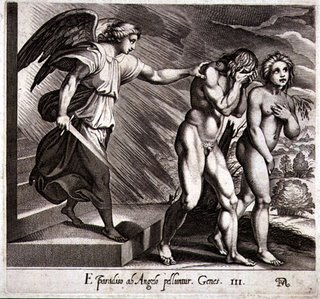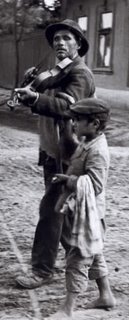
It was T.S. Eliot who said 'There is no competition among poets', so it's always a pity when the prize named after him rolls round again, as it's about to do. Hereunder, prompted by its impending visitation, some old thoughts on contemporary British poetry, as represented by
The New British Poetry, Charles Simic and Don Paterson's Britpo-explained-to-the-Yanks anthology for Graywolf.
It’s unfortunate the way anthologies get reviewed for their introductions rather than their contents, but since the contents of this US-published book will be familiar to anyone living in Britain or Ireland remotely interested in the subject (I counted one writer, John Glenday, whose work was new to me), that leaves us Don Paterson’s introduction to talk about. It’s a bizarre performance, confirming all the stereotypical faults of British poetry and adding some extra just for you. Faults such as: slavish deference to an imagined common reader, neurotic fear of innovation or anything too difficult, and a wounded, wary defensiveness in the face of any criticism. For reasons I fail to grasp Paterson devotes much of the intro to a group of poets not in his book and whom he doesn’t even bother naming. These are the evil Postmoderns, as against the Mainstream poets he has included, and yes, he does call them that. Is there a grimmer, more dismal label to pin on a writer than ‘mainstream’? I’d take a knee in the groin over a pat on the head for being any such thing, any day, but Paterson has his reasons. These are writers, he wants to reassure us, that steer a middle course between sestinas-R-us New Formalism and splatter-gun
L=A=N=G=U=A=G=E poetry. These mainstreamers are all-round regular kinda guys, and unlike their deviant counterparts still use language to communicate. They’re the (not so) young generation and they’ve got something to say, unlike those postmodern dingbats holding forth to their ‘academic’ audience. Which is presumably why back in the real world roughly half Paterson’s mainstreamers have taught creative writing in universities.
Paterson’s double-think on this subject is very repetitive, be warned. His pantomime villains are held up as laughable yet ubiquitously evil, insignificant yet powerful enough to have ruined playtime for all the other kiddies. The rightness of the mainstream cause is unassailable, yet must be thumpingly reiterated in the spirit of Hopkins’ ‘man bouncing up from the table’ (Robert Browning, in fact) ‘with his mouth full of bread and cheese and saying that he meant to stand no blasted nonsense.’ The literary history behind all this couldn’t be more conformist or unoriginal. Since the days of high modernism we’ve learned to live with T.S. Eliot, just about, but don’t go trying any Pound on us. The 1940s too tried to lead us astray, but then along came the 1950s and everything turned out just fine. Our current poetic Happy Meal comes with a heady swill of PR cant: the late Michael Donaghy’s poems are ‘perhaps’ (exquisite scruple) ‘built to last in a way few other poets in the language can currently rival’; Andrew Motion has ‘confounded the doubters by emerging as the most energetic and forceful advocate for the art [the laureateship] has seen’; John Burnside’s ‘radiant meditations have been perhaps’ (again!) ‘the most quietly and pervasively influential voice to have emerged in British poetry in the last twenty years’; and Jo Shapcott is ‘one of the most original voices in the language.’
There is talk of mainstream poets being brave enough to risk sounding mundane: ‘original expression… always runs the risk of cliché; the clear articulation of deep emotion always runs the risk of sentimentality; and taking the chance of being largely understood always runs the risk of being found to be talking a pile of garbage.’ Paterson is evidently happy to lead by example. And so on. To confront Paterson’s big question, though, every critic should have a line on the mainstream versus
avant garde debate, and mine is this. There certainly is such a thing as a soft mainstream orthodoxy that deserves nothing but scorn, but at the same time it is very difficult for writers to self-identify as innovative or
avant garde without falling headlong into sanctimony of the worst kind. For that reason alone it’s probably best to avoid such terms altogether where self-labelling is concerned. If there’s one thing I despair of, though, in debates about the mainstream and the
avant garde it’s the idea that all innovative writers write to a theory (dangerous, abstract, foreign) whereas traditionalists emote with the untutored genius of those feral children in Sir Thomas Browne who spoke perfect Hebrew. I can think of plenty of
avant garde critics who write to a system, but poets? It’s just a canard designed to stifle debate, and one which Paterson is all too happy to rehash: ‘far two few of them… have anything resembling what the Mainstream would recognise as a real compositional procedure… No: they have systems.’ Does Roy Fisher write to a system? Does Thomas Kinsella? Of course they don’t. But who knows, maybe Paterson doesn’t like them either.
But enough about this stupid tirade, and some more observations on the actual contents. There are thirty-six poets in the book. Time has run out on the Britishness of poets from Northern Ireland, they will be variously pleased or outraged to learn: it’s mainland mainstreamers only. Most poets get between four and six pages; John Ash gets eight, but Peter Reading looks orphaned and lost in his paltry three. Poems here that look like turning into anthology fixtures include: Paterson’s ‘Imperial’, Robin Robertson’s ‘Artichoke’ and Ian Duhig’s ‘The Lammas Hireling’, while others (Shapcott’s ‘Phrase Book’, Duffy’s ‘Prayer’, James Fenton’s ‘Wind’) are already so familiar as to be at risk of losing all impact. And is Fenton really a ‘New’ British poet, even to an American reader? Surely not.
I’ve berated Paterson for wasting time on writers he omits, but realize I haven’t said much myself about the poets who do make it into his book. My only defence is that the resistance I feel to the Paterson ‘mainstream’ tradition is just too strong: despite my liking for quite a few of these writers (Ash, Didsbury, Greenlaw, Hofmann, McKendrick, Oswald, Reading) I can’t accept reading them under the terms this book dictates. So let me at least offer some practical suggestions, as a resident alien in Britain, on how mainstream verse culture in this country might tackle its malaise. First, someone should abolish all poetry competitions, and with them the safe and predictable poems they spawn. Second, some other friendly axe-wielder should write off the deeply philistine National Poetry Day and all its works. Third, publishers should scrap the corrupt practice of solicited pre-publication blurbs, and the shot in the arm they provide to debutant writers who don’t deserve to be in print anyway. Fourth, journalists should stop equating contemporary poetry with the same small gallimaufry of regulars on the residency/competition-winning/Radio 4 circuit, and ask someone different for a change. And lastly, someone should reverse the respective standing and reputations of Philip Larkin and J.H. Prynne, Simon Armitage and the sound poet Jaap Blonk, whose collection of grunts and barks so enlivened the CD that came with the summer 2004 issue of
Poetry Review. I’ve no real reason for this last suggestion, apart from how much fun the ensuing confusion would be. And all this without mentioning the Next Generation Promotion, that poetic
Invasion of the Body Snatchers meets
The Empire Strikes Back, launched to the sound of a Paterson-soundalike whine in
The Guardian from Armitage about serving the common reader. Avoid at all costs.
‘If a gasometer, for instance, affects his emotions, or if the Marxian dialectic, let us say, interests his mind, then let them come into his poetry’, Louis MacNeice told F.R. Higgins. Was there a subclause I missed prohibiting him from being a postmodernist? I’ve always thought of postmodernism as a stupid idea, but no more so than ‘seamless evolution’, ‘consensual meaning’, whatever that means, or the other Leavisite zombies creaking through Paterson’s prose. If Carol Ann Duffy suddenly decided to turn postmodernist, that’d be fine by me (there are even some people who think she already is…). ‘Don’t start from the good old things but the bad new ones,’ as Bertolt Brecht told Walter Benjamin. Be a ‘mainstream’ poet even, if that’s what turns you on. Be whatever you want, but come up with better reasons for it than the mix of self-righteousness and self-pity that underpins this book.
Paterson concedes the existence of ‘a handful of attractive voices’ among the postmoderns, but nevertheless hasn’t included them here. Why not, if they’re as good as he says they are? Because from the position argued in his introduction the existence of alternative styles is simply unthinkable. The mainstream is all there is, and all there shall be, promos, prizes and anthologies like this without end, Amen. And that’s a terrible thought.





































